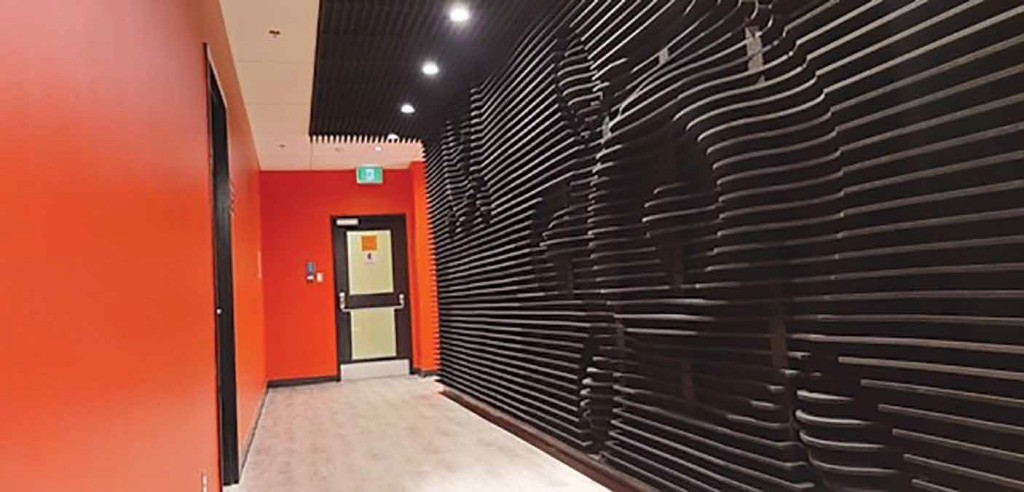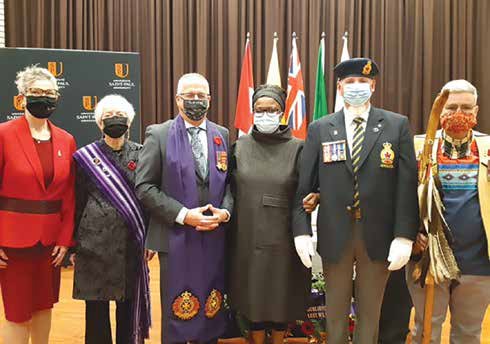Phyllis Odenbach Sutton

The hallway leading to the Indigenous Centre at Saint Paul University features a mural of a turtle, a key symbol for the First Peoples of Canada. Photo Supplied
Following from The Truth and Reconciliation Report and Universities Canada’s calls to action, Saint Paul University (SPU) has introduced a number of indigenous initiatives – actions that the university’s Rector, Chantal Beauvais, hopes will take root in the institution and be embraced by everybody. The Mainstreeter recently met with Beauvais to learn more about SPU’s strategic plan to support Transformative Leadership, heal broken human relationships and open a respectful dialogue with Canada’s first peoples.
During the meeting, Beauvais outlined some of the wide-ranging measures recently introduced by the university related to Indigenous peoples. Currently, approximately four percent of SPU’s student population self-identify as Indigenous. The university believes there may be more indigenous students but recognizes that people need to feel safe in order to self-identify. Many of SPU’s initiatives focus on creating “cultural safety”.
One such initiative is the new Indigenous Centre, designed by an Indigenous architect, and open to the entire SPU community. The Centre currently has two knowledge keepers on staff (one Algonquin, one Métis), with a new coordinator expected to be in place shortly. Student feedback has been very positive. Indeed, according to Beauvais, “Indigenous students feel at home, in part because their cultural symbols are also there, and for them, that is very, very important and reassuring.” The Centre has also become a preferred spot for many international students, some of whom have faced similar challenges in their own countries; they feel connected with the place, Beauvais notes, and culturally safe in its environment.
SPU has also created an indigenization committee made up of professors, deans, senior administration and Indigenous knowledge keepers. The goal of this committee is to examine indigenization across all programs, take steps to decolonize academia and incorporate Indigenous perspectives on knowledge. According to Beauvais, this is viewed as a long-term project, again because it needs to be embraced by everybody.
Another recent measure introduced by SPU is the mandatory undergraduate course, First Peoples of Canada, offered in both French and English. This course covers the Indigenous history of the entire country. A handful of professors teach the course, with input from the knowledge keepers and the indigenization committee. It is very important to SPU that the course is accurate and culturally relevant. During the discussion, Beauvais advised that she grew up in Algonquin territory northwest of Quebec but did not have much knowledge of Indigenous peoples at that time. From her perspective, one of the best remedies to overcome this lack of understanding is education. She noted that most of the students at SPU have been amazed by what they have learned in the mandatory course and shocked about what they did not know. The students are changed after they have completed the course, Beauvais says, and the outcome is that the students are becoming allies.

Saint Paul University’s Remembrance Day Ceremony – L to R: Chantal Beauvais, University Rector; Marie-Louise Perron, Knowledge Keeper; Chaplain-Colonel (Retired) Sylvain Maurais, CD ; Anne-Marie Habyalimana, Coordinator of Pastoral Services; Sharp Dopler CD Lt. (Navy) Retired, alumni; and Mizel Gauthier, Knowledge Keeper. Photo Supplied
The university has also established a number of bridging programs with Indigenous colleges which allow students to link their college diplomas with SPU’s bachelor degrees, primarily the Bachelor’s in Human Relations and Spirituality and the Bachelor’s in Social Innovation.
SPU is actively seeking support from many organizations to sponsor scholarships for Indigenous students, many of whom are traveling here from a remote community and thus face high transportation costs. Although students may receive scholarships from their Band Councils and from other Indigenous organizations, those awards do not necessarily cover all expenses.
Finally, the university has partnered with the Indigenous Women of Quebec organization to provide leadership/empowerment training so that women can become leaders in their communities. This program was co-designed by the organization and the university with the goal of ensuring that the courses offered are respectful of cultures and spiritualities. At the moment, only an English cohort is offered, but it is hoped that SPU will soon offer a French cohort as well.






